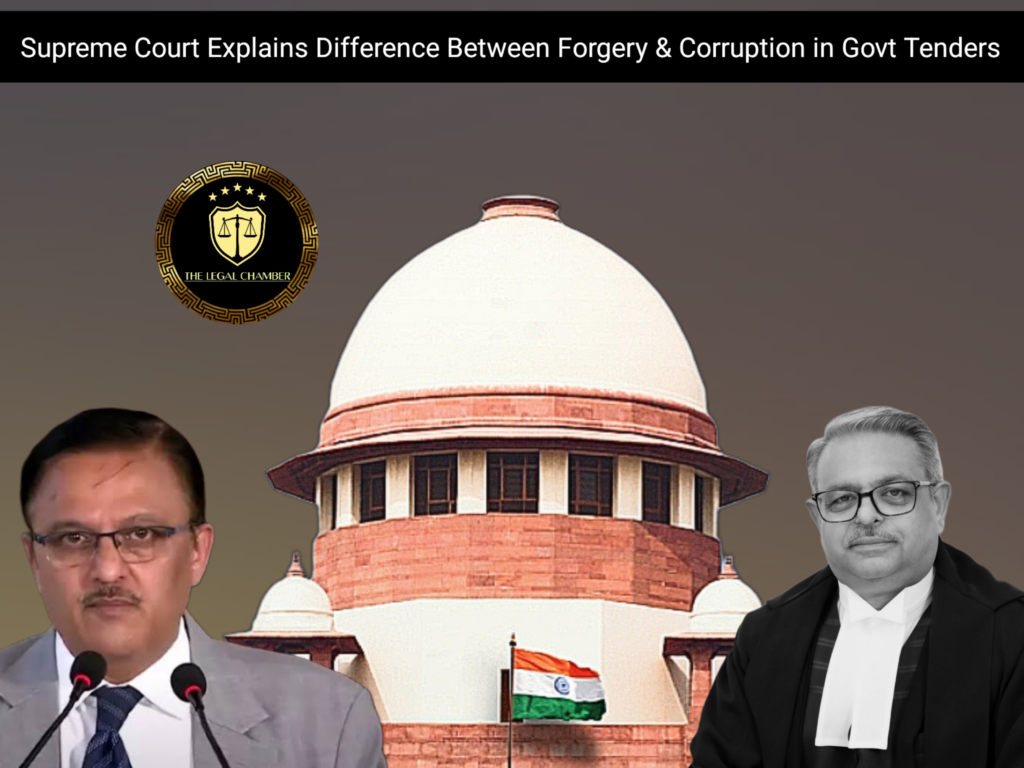
The Supreme Court partially allowed the appeal, upholding charges under Sections 409 (criminal breach of trust) and 468 IPC (forgery for cheating) against the appellant, a PWD engineer, for allegedly manipulating tender documents. However, it quashed charges under Section 13(1)(d) of the PC Act, holding no evidence of ‘criminal misconduct’ or pecuniary advantage. The Court clarified that discharge pleas require examining only prima facie evidence in the chargesheet, without assessing credibility at this stage. The ruling reaffirms the distinction between procedural irregularities and corrupt intent under anti-corruption laws
Facts Of The Case:
The case involved K.H. Kamaladini, an Executive Engineer in Goa’s Public Works Department, accused of manipulating 19 short tender notices for 847 water supply works between 2009–2011. A vigilance enquiry revealed that tenders were neither published in newspapers (as mandated by CPWD Manual) nor opened for competitive bidding, causing alleged losses to the exchequer. The key allegation was that Kamaladini handwrote “approved to take short tender without publishing in newspaper” above the Minister’s signature on documents, falsely implying ministerial authorization. A CFSL report confirmed the handwriting matched his, while the then-PWD Minister denied issuing such instructions. The prosecution also cited recovery of ₹18 lakh cash and jewelry from Kamaladini’s locker, though no direct link to the tender process was established. Charges were framed under Sections 409 (criminal breach of trust), 468 IPC (forgery), and Section 13(1)(d) of the Prevention of Corruption Act (PC Act) for criminal misconduct. While the Sessions Court and Bombay High Court upheld all charges, the Supreme Court partially agreed, quashing the PC Act charges due to lack of evidence showing pecuniary advantage or corrupt intent, but retained IPC charges based on prima facie evidence of document manipulation. The Court emphasized that discharge decisions must rely solely on chargesheet material without delving into evidentiary credibility.
Procedural History:
The case originated from a 2013 complaint to Goa’s Chief Vigilance Officer alleging irregularities in 19 water supply tenders. After a vigilance enquiry (March 2013) implicated the appellant, an FIR was registered (Crime No. 6/2013) for offences under Sections 409, 468, 471 IPC and Section 13(1)(d) PC Act. The chargesheet (May 2020) included forensic evidence (CFSL report) linking the appellant to handwritten alterations in tender documents. The Sessions Court, North Goa (February 2023) rejected the appellant’s discharge plea, framing charges under all sections. On revision, the Bombay High Court (March 2023) upheld this order, noting prima facie evidence of forgery and breach of trust. The Supreme Court (May 2025) partially allowed the appeal, quashing PC Act charges for lack of pecuniary advantage evidence but retaining IPC charges, emphasizing that discharge decisions must assess only prima facie chargesheet material (Sections 227/228 CrPC). The ruling clarified that parallel departmental exoneration doesn’t preclude criminal proceedings.
READ ALSO : No Double Benefits: Supreme Court Clarifies Double Deduction Rules Under Income Tax Act
Court Observation:
The Supreme Court made several critical observations while adjudicating the case. It emphasized that prima facie satisfaction for framing charges under Sections 227/228 CrPC requires only a superficial scrutiny of the chargesheet material, without evaluating evidentiary credibility at this stage. The Court noted the CFSL report and ministerial statement created a strong suspicion of forgery (Section 468 IPC) and criminal breach of trust (Section 409 IPC), justifying trial for these offences. However, it highlighted that Section 13(1)(d) PC Act demands proof of corrupt intent or pecuniary advantage, which was absent in the chargesheet. The Bench clarified that departmental exoneration holds no bearing on criminal proceedings, as the standards of proof differ. Importantly, it distinguished between procedural lapses (non-publication of tenders) and criminal misconduct, ruling that the former, without evidence of personal gain, doesn’t attract PC Act liability. The judgment reaffirmed that discharge petitions cannot involve a “mini-trial” of evidence.
Final Decision & Judgement:
The Supreme Court delivered a partially allowing judgment, modifying the impugned orders of the lower courts. While upholding the framing of charges under Sections 409 (criminal breach of trust) and 468 IPC (forgery) based on prima facie evidence of document manipulation, it quashed charges under Section 13(1)(d) of the PC Act, holding the prosecution failed to establish any pecuniary advantage or corrupt intent necessary for ‘criminal misconduct’. The Court clarified that its observations were limited to the discharge stage and wouldn’t prejudice the trial. It reiterated that the Trial Court must independently evaluate evidence during final adjudication, uninfluenced by these prima facie findings. The judgment underscored that mere procedural violations in tender processes, without proof of personal gain, don’t automatically attract anti-corruption provisions. Justice Oka’s bench thus struck a balance between accountability for alleged forgery and protecting public servants from unsubstantiated corruption charges.
Case Details:
Case Title:K.H. Kamaladini vs. State Citation:(2025) INSC 745 Appeal Number:Criminal Appeal No. 5380 of 2024 Date of Judgment:20th May, 2025 Bench: Justice Abhay S. Oka & Justice Augustine George Masih
Download The Judgement Here